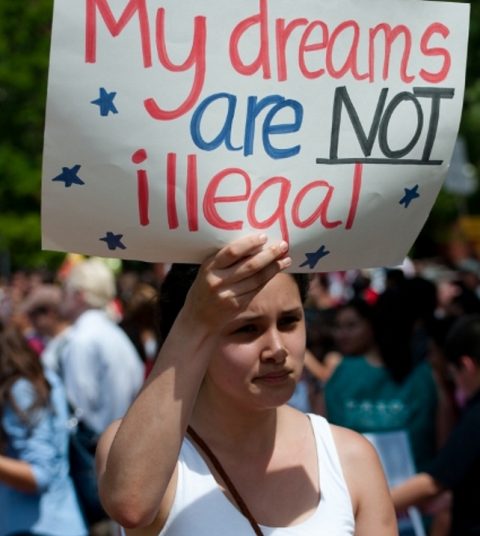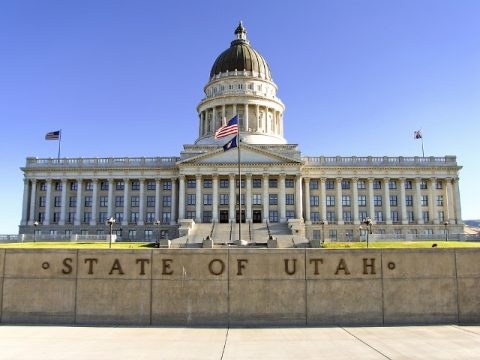Border Enforcement
Beyond A Border Solution
- Asylum
- May 3, 2023
America needs durable solutions. These concrete measures can bring orderliness to our border and modernize our overwhelmed asylum system. Read…
Read More
ICE Scaling Back 287(g) Program
The 287(g) program has been controversial and criticized for years, and immigrant advocates have demanded that US Immigration and Customs Enforcement (ICE) terminate the program. Section 287(g) of the INA allows the Secretary of Homeland Security to enter into agreements that delegate immigration powers to local police, but only through negotiated agreements, documented in Memoranda of Agreement (MOAs). The task force model deputizes police to enforce immigration laws in the course of their regular activities on the streets, and the jail model places deputized police officers within jails. A recent development raises questions about the future of the program. Read More

Immigration (Finally) Takes the Stage at a Presidential Debate
George W. Bush made several appearances in last night’s presidential debate, but perhaps nowhere with greater effect than when President Obama contrasted Governor Mitt Romney’s position on immigration reform. Where President Bush supported comprehensive immigration reform, declared President Obama, Governor Romney supports “self-deportation” and Arizona style anti-immigrant laws. Moderator Candy Crowley then segued into a direct immigration question from an undecided voter about Romney’s plans for dealing with the 11 million undocumented immigrants living in our nation. The next few minutes revealed a great deal about both candidates’ positions on the immigration question, but perhaps more importantly, the points where the candidates challenged each other suggest that both parties recognize they must begin talking about immigration in new ways. Read More

Pace of DACA Approvals Quickens, but Will it be Fast Enough?
For the first time since immigration authorities officially launched Deferred Action for Childhood Arrivals in mid-August, the federal government released statistics last Friday indicating that thousands of requests have been officially granted. But while the figures themselves are an encouraging sign, other evidence suggests that most applicants will not have their requests considered until after the next presidential inauguration in January, if at all. Read More

California Passes Groundbreaking Legislation to Prevent “Shattered Families”
By Yali Lincroft, Policy Consultant, First Focus Campaign for Children. Late last month, California Governor Jerry Brown signed into law two bills – AB2015 and SB1064 - which address the nightmare scenarios that can befall parents and their children caught up in the immigration system. The recent report Shattered Families: The Perilous Intersection of Immigrant Enforcement and the Child Welfare System describes the issue in detail including the “extent to which children in foster care are prevented from uniting with their detained or deported parents and the failures of the child welfare system to adequately work to reunify these families.” Read More

Maryland DREAM Act is a Smart Economic Investment
Education is an investment that yields sizeable dividends over time. Well-educated students go on to become well-educated workers who earn more, pay more in taxes, and are less likely to rely upon public benefits. This is why the DREAM Act, and all of the state-level bills that bear its name, make so much sense. Allowing unauthorized children to graduate from high school and go on to college isn’t simply an act of compassion; it is enlightened self-interest. These children will prove to be far more costly to the state in the long run if they are less educated and living in poverty. Read More

Kansans Push for Kobach Recall
Activists in Kansas are mounting a campaign to recall the state’s Secretary of State and notorious immigration restrictionist Kris Kobach. According to the Associated Press, there is a movement to collect signatures to recall him. For months, several groups have held rallies and press conferences, accusing Kobach of spending too much time working on his extracurricular activities – including promoting the anti-immigrant laws he authored in other states and attending immigration-related meetings – instead of serving the people of Kansas. Read More

Supreme Court Case Highlights Cruel Intersection of Immigration and Drug Laws
Tomorrow morning, the Supreme Court will hear arguments in a complicated immigration case involving how courts should determine whether a crime qualifies as an “aggravated felony.” Once the legal clutter is set aside, however, the case provides a clear example of how our nation’s immigration laws often fail to account for the most basic considerations of fairness and proportionality. If the Justices rule in the government’s favor, a lawful permanent resident with two U.S. citizen children could be deported from the country—and permanently barred from returning—for possessing less than $30 worth of marijuana. Read More

Got Clarity? “Illegal Immigrant” Is More than Just a Term
Over the last few weeks, New York Times Public Editor Margaret Sullivan has been weighing a challenge from fellow journalist and self-described “undocumented immigrant” Jose Antonio Vargas—drop the use of “illegal immigrant” as the Times default description of the 12 million undocumented people in the United States. Sullivan invited and received public comment on the challenge, much of which made subtle and nuanced pleas to use terms that were less insulting and more accurate. This week, calling her decision somewhat anti-climactic, Sullivan recommended that the Times stick with its current style guide because illegal immigrant is a term that is “brief, descriptive, and “gets its job done in two words that are easily understood.” Read More

Utah Attorney General Pushes Sensible Immigration Policies
Republican Utah Attorney General Mark Shurtleff has become a poignant and effective advocate for smart immigration policies, including the DREAM Act. On Monday, Shurtleff spoke at the Immigration Law and Policy Conference, in Washington D.C., where he concluded that the “biggest casualty in the immigration debate is the truth.” Shurtleff understands prosecutorial discretion, and is firmly behind the Obama Administration’s recent decisions to exercise prosecutorial discretion for immigrant youth (Deferred Action for Childhood Arrivals, DACA) and in cases where the individuals are not enforcement priorities. Shurtleff went on to describe Utah’s recent immigration legislation, which includes an enforcement law, as well as a provision that creates a state guestworker program. He explained that he is still in conversations withthe federal government about how Utah can exercise prosecutorial discretion for unauthorized “guestworkers” and the employers who hire them. Read More

California Governor Vetoes TRUST Act
In a disheartening development for immigrants’ rights advocates, California Governor Jerry Brown vetoed the TRUST Act on Sunday just hours before it was scheduled to take effect. The measure, which was intended to minimize the humanitarian impact of the federal Secure Communities program, would have largely prohibited state and local jails from detaining suspects on behalf of federal immigration authorities. Importantly, however, Gov. Brown rejected a central argument of the bill’s critics in his veto message and pledged to work with the California legislature to fix what he described as the flaws in the bill. Read More
Make a contribution
Make a direct impact on the lives of immigrants.

